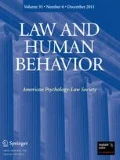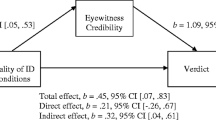Abstract
It has been argued that psychologists should provide expert evidence to help jurors discriminate between accurate and inaccurate eyewitness identifications. In this article we compare the effects of judicial instruction with expert evidence that is either congruent or incongruent with the ground truth, focusing on juror ability to evaluate “real” eyewitness evidence. In contrast to studies which have employed “fictional” eyewitness designs, we found no appreciable effect of either congruent or incongruent expert evidence on participant-juror sensitivity to eyewitness accuracy. We discuss the role of methodology on the inferences and conclusions that can be made regarding the impact of eyewitness expert evidence.

Similar content being viewed by others
References
Benton, T. R., Ross, D. F., Bradshaw, E., Thomas, W., & Bradshaw, G. S. (2006). Eyewitness memory is still not common sense: Comparing jurors, judges and law enforcement to eyewitness experts. Applied Cognitive Psychology, 20(1), 115–129.
Blonstein, R., & Geiselman, E. (1990). Effects of witnessing conditions and expert witness testimony on credibility of an eyewitness. American Journal of Forensic Psychology, 8(4), 11–19.
Bothwell, R. K., Deffenbacher, K. A., & Brigham, J. C. (1987). Correlation of eyewitness accuracy and confidence: Optimality hypothesis revisited. Journal of Applied Psychology, 72, 691–695.
Bradfield, A., & Wells, G. L. (2000). The perceived validity of eyewitness identification testimony: A test of the five Biggers criteria. Law and Human Behavior, 24(5), 581–594.
Brewer, N., & Burke, A. (2002). Effects of testimonial inconsistencies and eyewitness confidence on mock-juror judgments. Law and Human Behavior, 26(3), 353–364.
Brewer, N., & Wells, G. L. (2006). The confidence-accuracy relationship in eyewitness identification: Effects of lineup instructions, foil similarity, and target-absent base rates. Journal of Experimental Psychology: Applied, 12(1), 11–30.
Brigham, J. C. (1988). Is witness confidence helpful in judging eyewitness accuracy? In M. M. Gruneberg, P.E. Morris, & R. N Sykes (Eds.), Practical aspects of memory: Current research and issues, Vol. 1: Memory in everyday life (pp. 77–82). Oxford, England: Wiley.
Cutler, B. L., Dexter, H. R., & Penrod, S. D. (1989). Expert testimony and jury decision making: An empirical analysis. Behavioral Sciences & the Law, 7(2), 215–225.
Cutler, B. L., Dexter, H. R., & Penrod, S. D. (1990). Nonadversarial methods for sensitizing jurors to eyewitness evidence. Journal of Applied Social Psychology, 20(14, Pt 2), 1197–1207.
Cutler, B. L., & Penrod, S. D. (1995). Mistaken identification: The eyewitness, psychology, and the law. Cambridge: Cambridge University Press.
Cutler, B. L., Penrod, S. D., & Dexter, H. R. (1989). The eyewitness, the expert psychologist, and the jury. Law and Human Behavior, 13(3), 311–332.
Cutler, B., Penrod, S. D., & Stuve, T. E. (1988). Juror decision making in eyewitness identification cases. Law and Human Behavior, 12(1), 41–55.
Devenport, J. L., & Cutler, B. L. (2004). Impact of defense-only and opposing eyewitness experts on juror judgments. Law and Human Behavior, 28(5), 569–576.
Devenport, J. L., Stinson, V., Cutler, B. L., & Kravitz, D. A. (2002). How effective are the cross-examination and expert testimony safeguards? Jurors’ perceptions of the suggestiveness and fairness of biased lineup procedures. Journal of Applied Psychology, 87(6), 1042–1054.
Fleet, M. L., Brigham, J. C., & Bothwell, R. K. (1987). The confidence-accuracy relationship: The effects of confidence assessment and choosing. Journal of Applied Social Psychology, 17(2), 171–187.
Fox, S. G., & Walters, H. A. (1986). The impact of general versus specific expert testimony and eyewitness confidence upon mock juror judgment. Law and Human Behavior, 10(3), 215–228.
Geiselman, R. E., Putman, C., Korte, R., Shahriary, M., Jachimowicz, G., & Irzhevsky, V. (2002). Eyewitness expert testimony and juror decisions. American Journal of Forensic Psychology, 20(3), 21–36.
Greene, E. (1988). Judge’s instruction on eyewitness testimony: Evaluation and revision. Journal of Applied Social Psychology, 18(3, Pt 1), 252–276.
Greene, E., & Loftus, E. F. (1984). Solving the eyewitness problem. Behavioral Sciences & the Law, 2(4), 395–406.
Gross, S. R., Jacoby, K., Matheson, D. J., Montgomery, N., & Patil, S. (2005). Exonerations in the United States; 1989 through 2003. The Journal of Criminal Law & Criminology, 95(2), 523–560.
Hoffheimer, M. H. (1989). Effect of particularized instructions on evaluation of eyewitness identification evidence. Law & Psychology Review, 13, 43–58.
Hosch, H. M., Beck, E. L., & McIntyre, P. (1980). Influence of expert testimony regarding eyewitness accuracy on jury decisions. Law and Human Behavior, 4(4), 287–296.
Judicial Commission of NSW. (2006). Criminal trial courts bench book. Retrieved 21 March 2006, from http://www.jc.nsw.gov.au/ctcbb/main.html?.
Kassin, S. M., Ellsworth, P. C., & Smith, V. L. (1989). The “general acceptance” of psychological research on eyewitness testimony: A survey of the experts. American Psychologist, 44(8), 1089–1098.
Kassin, S. M., Tubb, V. A., Hosch, H. M., & Memon, A. (2001). On the “general acceptance” of eyewitness testimony research. American Psychologist, 56(5), 405–416.
Katzev, R. D., & Wishart, S. S. (1985). The impact of judicial commentary concerning eyewitness identifications on jury decision making. Journal of Criminal Law & Criminology, 76(3), 733–745.
Krug, K. (2007). The relationship between confidence and accuracy: Current thoughts of the literature and a new area of research [Electronic Version]. Applied Psychology in Criminal Justice, 3(1), 7–41.
Leippe, M. R. (1995). The case for expert testimony about eyewitness memory. Psychology, Public Policy, and Law, 1(4), 909–959.
Leippe, M. R., Eisenstadt, D., Rauch, S. M., & Seib, H. M. (2004). Timing of eyewitness expert testimony, jurors’ need for cognition, and case strength as determinants of trial verdicts. Journal of Applied Psychology, 89(3), 524–541.
Lindsay, R. C. L. (1994). Expectations of eyewitness performance: Jurors’ verdicts do not follow from their beliefs. In D. F. Ross, J. D. Read, & M. P. Toglia (Eds.), Adult eyewitness testimony: Current trends and developments (pp. 362–384). New York, NY, US: Cambridge University Press.
Lindsay, R., Wells, G. L., & O’Connor, F. (1989). Mock-Juror belief of accurate and inaccurate eyewitnesses: A replication and extension. Law and Human Behavior, 13(3), 333–339.
Loftus, E. F. (1980). Impact of expert psychological testimony on the unreliability of eyewitness identification. Journal of Applied Psychology, 65(1), 9–15.
Luus, C. A., & Wells, G. L. (1994). The malleability of eyewitness confidence: Co-witness and perseverance effects. Journal of Applied Psychology, 79(5), 714–723.
Maass, A., Brigham, J. C., & West, S. G. (1987). Testifying on eyewitness reliability: Expert advice is not always persuasive. In L. S. Wrightsman, C. E. Willis, & S. M. Kassin (Eds.), On the witness stand (pp. 240–262). Thousand Oaks, CA, US: Sage Publications, Inc.
Macmillan, N. A., & Creelman, C. D. (2005). Detection theory a user’s guide (2nd ed.). Routledge.
Penrod, S. D., & Cutler, B. (1999). Preventing mistaken convictions in eyewitness identification trials: The case against traditional safeguards. In R. Roesch, S. D. Hart, & J. R. P. Ogloff (Eds.), Psychology and law: The state of the discipline (pp. 89–118). Dordrecht, Netherlands: Kluwer Academic Publishers.
Pezdek K. (2007). Expert testimony on eyewitness memory and identification. In M. Costanzo, D. Krauss, & K. Pezdek (Eds.), Expert psychological testimony for the courts (Chapter 4). Mahwah, NJ: Erlbaum.
Ramirez, G., Zemba, D., & Geiselman, R. (1996). Judges’ cautionary instructions on eyewitness testimony. American Journal of Forensic Psychology, 14(1), 31–66.
Scheck, B., & Neufeld, P. (2006). The innocence project. Retrieved March 7, 2006, from http://www.innocenceproject.org.
Scheck, B., Neufeld, P., Dwyer, J. (2001). Actual innocence (2nd ed.). New York, NY: Signet Printing.
Sporer, S., Penrod, S., Read, D., & Cutler, B. (1995). Choosing, confidence, and accuracy: A meta-analysis of the confidence-accuracy relation in eyewitness identification studies. Psychological Bulletin, 118(3), 315–327.
U .S. v Telfaire, 469 F.2d 552 (D.C. Cir. 1972).
Weber, N., & Brewer, N. (2003). The effect of judgment type and confidence scale on confidence-accuracy calibration in face recognition. Journal of Applied Psychology, 88(3), 490–499.
Wells, G. L. (1986). Expert psychological testimony: Empirical and conceptual analyses of effects. Law and Human Behavior, 10(1–2), 83–95.
Wells, G. L., Lindsay, R., & Ferguson, T. J. (1979). Accuracy, confidence, and juror perceptions in eyewitness identification. Journal of Applied Psychology, 64(4), 440–448.
Wells, G. L., Lindsay, R. C., & Tousignant, J. P. (1980). Effects of expert psychological advice on human performance in judging the validity of eyewitness testimony. Law and Human Behavior, 4(4), 275–285.
Acknowledgements
This research was supported by Discovery Grant DP0452699 from the Australian Research Council to the second author. We also thank Amanda Barnier, Nathan Weber and the following students for their contributions; Jade Hucker, Erin Littlewood, Alexa Muratore, Tamara Sweller and Shaina Terry.
Author information
Authors and Affiliations
Corresponding author
About this article
Cite this article
Martire, K.A., Kemp, R.I. The Impact of Eyewitness Expert Evidence and Judicial Instruction on Juror Ability to Evaluate Eyewitness Testimony. Law Hum Behav 33, 225–236 (2009). https://doi.org/10.1007/s10979-008-9134-z
Received:
Accepted:
Published:
Issue Date:
DOI: https://doi.org/10.1007/s10979-008-9134-z



